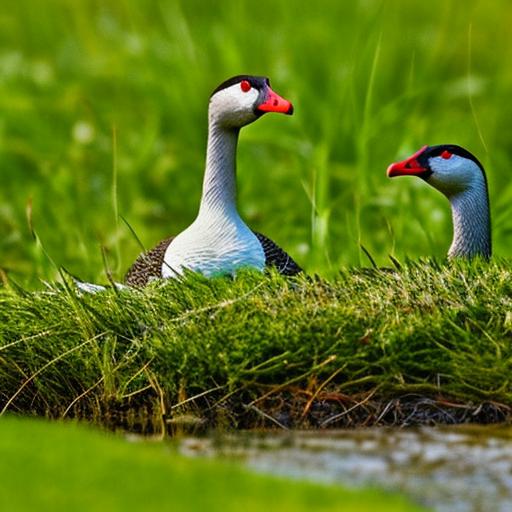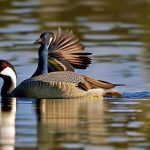Geese are beautiful creatures that are often found near bodies of water, but they can become a nuisance when they invade your lawn. Understanding their behavior and finding effective ways to keep them away from your grass is important for maintaining the health and appearance of your lawn. In this article, we will explore various strategies to deter geese from grazing on your grass, including natural methods, decoys, physical barriers, sound deterrents, repellents, trained dogs, and seeking professional help.
Key Takeaways
- Geese are social animals that prefer to graze in groups and are attracted to open spaces with easy access to water.
- Geese can cause significant damage to grass by overgrazing, trampling, and leaving droppings that can lead to health hazards.
- Natural methods to keep geese away from grass include planting tall grasses, using reflective tape, and installing motion-activated sprinklers.
- Decoys such as fake predators or other animals can deter geese from your lawn by creating the illusion of danger.
- Physical barriers such as fences, netting, or hedges can prevent geese from accessing your grass and nesting on your property.
Understanding the behavior of geese
Geese are attracted to grass because it is a source of food for them. They are herbivores and graze on grass by plucking it with their beaks. Geese are social animals and often travel in flocks, which can make their presence on your lawn even more problematic. They have a tendency to leave droppings behind, which can be unsightly and pose health risks.
Geese are also known for their territorial behavior. They may become aggressive if they feel threatened or if they perceive your lawn as their territory. This can be a concern if you have children or pets that use the lawn regularly. Understanding these behaviors is crucial in finding effective ways to keep geese away from your grass.
Identifying the damage caused by geese on grass
Geese can cause various types of damage to grass. Their constant grazing can lead to patches of bare soil and uneven growth patterns on your lawn. This can result in an unsightly appearance and make it difficult for the grass to recover. Additionally, their droppings can create a mess on your lawn that requires frequent cleaning.
Furthermore, geese can harm the environment and other wildlife. Their grazing habits can disrupt the natural balance of ecosystems by depleting vegetation that other animals rely on for food and shelter. Their droppings can also contribute to water pollution if they accumulate near bodies of water. Understanding the potential damage caused by geese on grass is essential in finding effective solutions to keep them away.
Natural methods to keep geese away from grass
One natural method to deter geese from your lawn is to plant certain types of vegetation that they find unappealing. Geese prefer short, tender grass, so planting taller grass varieties can discourage them from grazing on your lawn. Additionally, planting shrubs or trees near the edge of your lawn can create a physical barrier that geese are less likely to cross.
Another natural method is to introduce natural predators of geese, such as foxes or coyotes, to your area. However, this method may not be feasible or legal in all locations. It is important to research and understand the regulations and potential consequences before considering this option.
Using decoys to deter geese from your lawn
Decoys can be an effective way to trick geese into thinking there is a predator nearby, which can discourage them from landing on your lawn. There are various types of decoys available, including ones that resemble predators like owls or coyotes. These decoys can be placed strategically around your lawn to create the illusion of a threat.
It is important to regularly move the decoys around your lawn to prevent geese from becoming accustomed to their presence. Additionally, using a combination of different types of decoys can increase their effectiveness. For example, using both owl and coyote decoys can create a more realistic and intimidating environment for geese.
Creating physical barriers to prevent geese from accessing your grass

Physical barriers can be an effective way to keep geese away from your lawn. One option is to install fencing around your property or specific areas of your lawn. The fence should be at least three feet high and have small gaps or mesh that prevents geese from squeezing through.
Another option is to use netting or fishing line to create a barrier that geese cannot easily cross. This can be done by attaching the netting or fishing line to stakes and placing them strategically around your lawn. The visual obstruction created by the netting or fishing line can deter geese from landing on your grass.
Installing sound deterrents to keep geese away from your lawn
Sound deterrents can be an effective way to scare geese away from your lawn. There are various types of sound deterrents available, including devices that emit loud noises or mimic the sounds of predators. These devices can be placed strategically around your lawn to create a threatening environment for geese.
It is important to regularly change the location and timing of the sound deterrents to prevent geese from becoming accustomed to the noise. Additionally, using a combination of different types of sound deterrents can increase their effectiveness. For example, using both loud noise devices and predator sound devices can create a more realistic and intimidating environment for geese.
Applying repellents to discourage geese from grazing on your grass
Repellents can be applied to your lawn to discourage geese from grazing on the grass. There are various types of repellents available, including ones that emit unpleasant odors or taste deterrents that make the grass unappealing to geese. These repellents can be sprayed directly on the grass or applied as granules.
It is important to follow the instructions provided by the manufacturer when applying repellents. Additionally, it may be necessary to reapply the repellents regularly, especially after rainfall or mowing, to ensure their effectiveness. Using a combination of different types of repellents can also increase their effectiveness.
Using trained dogs to chase geese off your property
Trained dogs can be an effective way to chase geese away from your lawn. Border collies are commonly used for this purpose because they have a natural herding instinct and are highly trainable. By using specific commands and training techniques, you can teach your dog to chase geese away without causing harm to the geese or your lawn.
It is important to consult with a professional dog trainer or behaviorist to ensure that the training is done correctly and safely. Additionally, it is crucial to provide proper care and attention to your dog to maintain their effectiveness as a geese deterrent. Regular training sessions and exercise are necessary to keep your dog engaged and motivated.
Seeking professional help to manage geese infestation on your lawn
In some cases, it may be necessary to seek professional help to manage a geese infestation on your lawn. Professional wildlife control companies specialize in dealing with geese and can provide effective solutions tailored to your specific situation. They have the knowledge, experience, and equipment necessary to safely and humanely remove geese from your property.
Additionally, some municipalities or local organizations may offer geese management programs or services. These programs often involve the use of trained professionals who can assess the situation and implement appropriate strategies to deter geese from your lawn.
Adopting a combination of strategies to keep geese off your grass
To increase the effectiveness of keeping geese away from your lawn, it is often necessary to adopt a combination of different strategies. Geese can become accustomed to certain deterrents over time, so using a variety of methods can prevent them from adapting and finding ways around the deterrents.
When choosing a combination of strategies, it is important to consider the specific needs and characteristics of your lawn. Factors such as the size of your lawn, proximity to bodies of water, and local regulations should be taken into account. Consulting with professionals or experts in geese management can help you determine the most suitable combination of strategies for your situation.
Keeping geese away from your grass requires an understanding of their behavior and implementing effective strategies. Natural methods, decoys, physical barriers, sound deterrents, repellents, trained dogs, and seeking professional help are all viable options to consider. By adopting a combination of strategies and regularly assessing their effectiveness, you can maintain a beautiful and geese-free lawn. Take action today to protect your grass and enjoy a hassle-free outdoor space.
If you’re looking for more information on how to keep geese off your grass, you might also be interested in this article on Poultry Wizard’s website about the importance of having a heater for a chicken coop. A well-insulated coop with a heater can not only keep your chickens warm during colder months but also deter geese from invading their space. Check out the article here to learn more about how a heater can benefit both your chickens and your lawn.
FAQs
What are some effective ways to keep geese off your grass?
There are several ways to keep geese off your grass, including using decoys, installing fencing, using repellents, and modifying the landscape.
What are some natural repellents that can be used to keep geese away?
Some natural repellents that can be used to keep geese away include planting tall grasses, using predator urine, and using reflective tape or balloons.
What are some non-lethal methods of controlling geese populations?
Non-lethal methods of controlling geese populations include using noise deterrents, modifying the landscape, and using repellents.
What are some common mistakes people make when trying to keep geese off their property?
Some common mistakes people make when trying to keep geese off their property include using ineffective repellents, not using enough deterrents, and not addressing the root cause of the problem.
What are some long-term solutions for keeping geese off your property?
Some long-term solutions for keeping geese off your property include modifying the landscape to make it less attractive to geese, using fencing or netting, and using trained dogs to deter geese.
Meet Walter, the feathered-friend fanatic of Florida! Nestled in the sunshine state, Walter struts through life with his feathered companions, clucking his way to happiness. With a coop that’s fancier than a five-star hotel, he’s the Don Juan of the chicken world. When he’s not teaching his hens to do the cha-cha, you’ll find him in a heated debate with his prized rooster, Sir Clucks-a-Lot. Walter’s poultry passion is no yolk; he’s the sunny-side-up guy you never knew you needed in your flock of friends!







